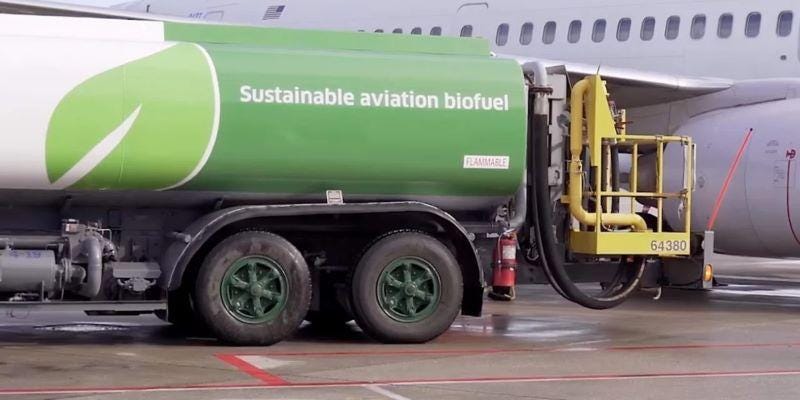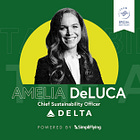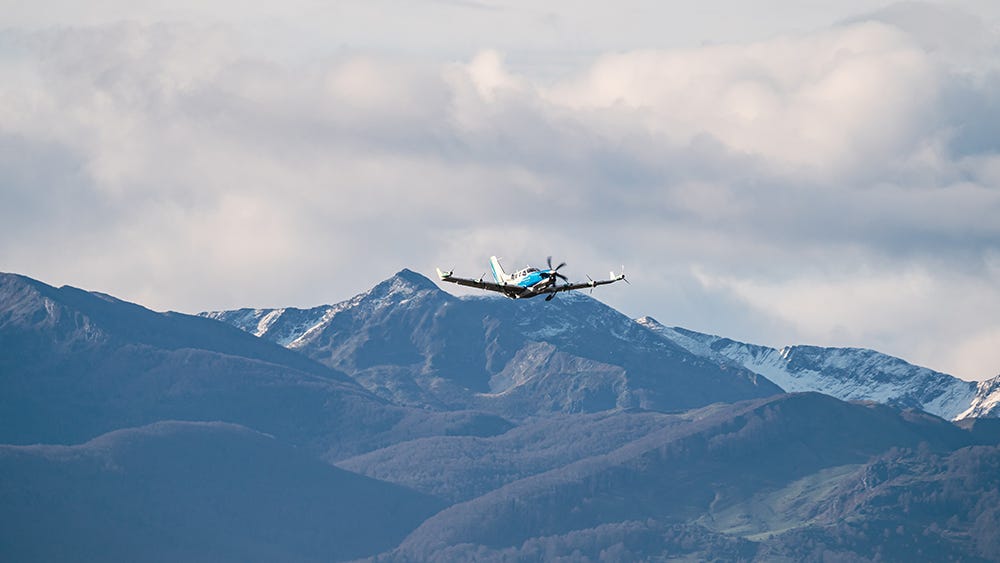#Sustainability20: U.S. Clears Path For SAF From Corn Ethanol & More
Weekly Roundup - 22/12/23
Each Friday, we publish a round-up of the 20 most important stories on sustainable aviation. You can see previous editions of #Sustainability20 here.
Industry Updates
The Biden administration's guidance for the sustainable aviation fuel (SAF) tax credit, part of the 2022 Inflation Reduction Act, now includes corn and soybeans as feedstocks. The credit, up to $1.75 per gallon, requires a minimum 50% reduction in life-cycle greenhouse gas emissions. Producers must use an approved life-cycle analysis model, with the ICAO CORSIA model as the primary tool, to qualify.
Alaska Airlines, partnering with CHOOOSE, offers frequent flyers a new way to earn status by purchasing SAF or supporting nature-based climate projects, reducing environmental impact without needing to book additional trips.
From hiring a new Chief Sustainability Officer to continued initiatives to reduce emissions while spurring SAF production and reducing single-use-plastics on board.
Analysis reveals that nearly half of 217 global companies reduced business travel emissions by 50% from 2019 to 2022, with corporate air travel recovering slower than leisure post-pandemic.
Steven Udvar-Hazy, executive chairman of Air Lease Corporation, predicts that hydrogen-powered aircraft will be commercially viable and ready to replace modern jets in several decades. Speaking at Recaro Aircraft Seating Americas’ 25th Anniversary, he noted current jet engines are nearing their physical limits, with only 10-15% potential improvement in fuel efficiency remaining.
American Airlines has been included in the Dow Jones Sustainability World Index for the first time and returns to the Dow Jones Sustainability North America Index for the third consecutive year, recognised as a global sustainability leader among the top 10% of the largest 2,500 companies in the S&P Global Broad Market Index.
KPMG forecasts a SAF supply surge by 2030 due to investments, but market limitations and feedstock constraints could lead to high costs and supply shortages. Activists critique the approach as costly and insufficient for achieving the 2050 net-zero goal, while airlines worry about rising fares due to expensive biofuels.
CLIMATE WATCH: Failure of Cop28 on fossil fuel phase-out is ‘devastating’, say scientists - NYT
Scientists have described the failure of Cop28 to explicitly call for a fossil fuel phase-out as "devastating" and a "tragedy for the planet," citing the urgent need for climate action. The compromise deal, while historic for acknowledging fossil fuels as the root cause of the climate crisis, was criticised for being too weak and filled with loopholes. The term "phase-out" was blocked by petrostates, leading to a milder "transition away" agreement.
Infrastructure and operational efficiencies
CPK's multimodal design integrates various transport modes. From its inception, CPK will be 'Net Zero Ready', using renewable energy for all operations while minimising environmental impact on local ecosystems by maintaining a safe distance from protected nature zones.
Pittsburgh International Airport's unique microgrid, operational since 2021, allows for complete self-sufficiency in power generation, with the traditional grid serving as backup. This innovation supports PIT's sustainability goals by reducing energy costs, cutting carbon emissions by around 6 million pounds in 2022, and saving at least $1.5 million annually in utility costs.
Sustainable Aviation Fuel (SAF)
NASA and GE Aerospace's HyTEC program, launched in 2021, aims to design and test next-generation commercial aircraft engines for improved fuel efficiency and reduced emissions. Phase 2 involves advancing core engine components—high-pressure compressor, combustor, and turbine—for a demonstrator test later this decade, including evaluating performance with 100% SAF from renewable sources.
Rolls-Royce's new SAFinity program, open to business aviation customers globally, offers a blend of sustainability projects and direct investment in SAF. Designed for all business aircraft and engines, regardless of manufacturer, SAFinity supports more sustainable flight operations and Rolls-Royce's goal for net-zero carbon by 2050.
Neste plans to invest 2.5 billion euros to transform its Porvoo crude oil refinery in Finland into a biofuels facility, aiming to exit fossil fuel production. The Porvoo refinery conversion, set for completion by the mid-2030s, will increase Neste's total renewables capacity to 9.3 million metric tons, with half dedicated to SAF production.
New technology: Electric and Hydrogen
Airbus's hybrid-electric plane, EcoPulse, successfully completed its first flight in hybrid mode, demonstrating its propulsion system in flight. Departing from Tarbes Airport on November 29 for a 100-minute flight, the EcoPulse, developed with Daher and Safran, aims to decarbonise aviation. The EcoPulse, unveiled in 2019, features six electric thrusters powered by Safran engines, promising reduced emissions and noise.
Rolls-Royce has initiated testing of aerospace-grade pumps designed for cryogenic liquid hydrogen. This development is a key component of the company's expanding research into hydrogen's role in achieving future zero-emission aviation.
JSX, a U.S. regional air carrier, plans to purchase over 130 hybrid-electric aircraft from three start-ups, potentially exceeding 330, with options. Firm orders include 50 Era aircraft from Aura Aero, 50 ES-30s from Heart Aerospace, and 32 from Electra, with potential totals of 150, 100, and 82 from each company, respectively.
Archer Aviation, a Silicon Valley eVTOL developer, aims to create autonomous eVTOL aircraft, leveraging technology from former rival Wisk Aero. Archer's current focus is on piloted vehicles to quickly enter the market, but plans to transition to autonomy as the advanced air mobility industry grows, inspired by Wisk's approach to market its four-passenger eVTOL as an autonomous air taxi.
Overair has finished assembling the first full-scale prototype of its Butterfly eVTOL aircraft, targeting flight tests in early 2024. This testing will validate its unique Optimum Speed Tilt Rotor and Individual Blade Control technologies, promising enhanced performance, reliability, and low noise. The Butterfly, featuring oversized rotors and a simplified design, aims for FAA type certification and service entry in 2028.
Airbus is nearing the power-on stage for its CityAirbus NextGen eVTOL prototype. Launched in 2021, the aircraft features eight propellers and 16 electrical power units for redundancy. Designed to carry a pilot and three passengers, the multi-rotor aircraft's flight test campaign is set to start in 2024, initially in a dedicated 1,000-square-meter eVTOL test center in Donauworth.
Rolls-Royce has commenced a new phase of hydrogen propulsion research, focusing on cryogenic liquid hydrogen pump systems at its UK facility. This is part of its collaboration with easyJet to develop hydrogen powertrains for future narrow-body airliners. The program aims to address challenges in using liquid hydrogen for aircraft engines, ensuring fuel combustion, delivery, and systems integration are safe.
A UConn research team is developing a carbon-neutral energy storage and power generation system, potentially an alternative for aircraft propulsion. The system combines fuel cells, turbogenerators using SAF, and batteries for extra power during climb phases, recharging on descent.







